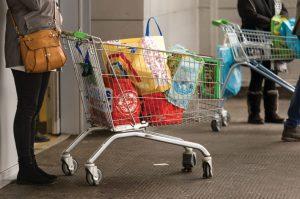BLOOMBERG
Britain’s biggest supermarkets said they’re keeping food prices as low as possible in response to questions from UK politicians on whether they’re profiteering from rampant inflation on groceries.
Representatives from Tesco Plc, J Sainsbury Plc, Asda and Morrisons were asked whether they have been “behaving†in their pricing for cash-strapped shoppers, by politicians on the House of Commons Business and Trade committee. All the supermarkets highlighted that their profits have declined in the past year as they have tried to minimise price increases.
“We are acutely aware of the pressure that many millions of ordinary people have come under as a result of this cost-of-living crisis and food inflation in particular,†said David Potts, Chief Executive Officer of Morrisons.
Supermarkets are in the political spotlight as food emerges as a larger contribution to inflation than energy. The consumer prices index rose the same amount in May as the previous month, surprising markets and leading to a larger-than-expected Bank of England rate rise.
Grocers have been passing on some price cuts in recent weeks including in staples like milk, bread and butter. Those measures led to food price inflation falling for a second month to 14.6%, according to the British Retail Consortium. That’s still well above the average inflation in shops at 8.4%.
Asda is still lowering prices despite higher debt payments after its takeover by the billionaire Issa brothers and TDR Capital, said Kris Comerford, chief commercial officer at Asda.
“We are inflating behind our input costs,†said Rhian Bartlett, food commercial director at Sainsbury.
The supermarkets were asked to justify paying out dividends to investors when their customers are so badly off. Scrutiny was also placed on executive salaries, particularly Sainsbury CEO Simon Roberts who took home £4.95 million ($6.3 million) in pay last year.
“How is that justifiable when people who come into stores are suffering from a grotesque cost of living crisis?†asked Labour MP Andy McDonald.
Sainsbury unveiled plans to make £15 million worth of price cuts on household staples including pasta, rice and cornflakes while discounter Aldi lowered the price of toilet roll by 24 pence.
Marks & Spencer Group Plc reduced prices on more than 70 items earlier in June, while Morrisons announced its sixth round of price cuts this year, costing the retailer £26 million.
Bank of England rate-setter Swati Dhingra said she doesn’t see much evidence of greedflation in grocery prices.
Still, inflation is proving particularly sticky in the UK, remaining above more than four times the target rate for the past 14 months. That’s putting at risk Prime Minister Rishi Sunak’s promise to halve inflation this year, one of his five core pledges to voters.
After suggesting in May that it was considering voluntary price caps for grocers, the government has since backed away from the idea.
M&S chairman Archie Norman had called the idea “harebrained†while Stuart Rose, chairman of Asda, said interventions would be “clumsy.â€
Sunak’s spokesman, Max Blain, told reporters that the government doesn’t support price caps. “We don’t think that is the right approach,†he said.
 The Gulf Time Newspaper One of the finest business newspapers in the UAE brought to you by our professional writers and editors.
The Gulf Time Newspaper One of the finest business newspapers in the UAE brought to you by our professional writers and editors.
